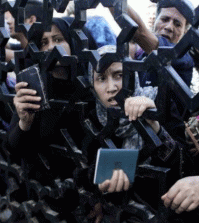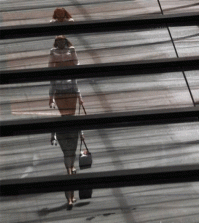- Finding Unshakable Power in a World That Wants to Pull Us ApartPosted 2 weeks ago
- What could a Donald Trump presidency mean for abortion rights?Posted 2 weeks ago
- Financial Empowerment: The Game-Changer for Women in Relationships and BeyondPosted 2 months ago
- Mental Health and Wellbeing Tips During and After PregnancyPosted 2 months ago
- Fall Renewal: Step outside your Comfort Zone & Experience Vibrant ChangePosted 2 months ago
- Women Entrepreneurs Need Support SystemsPosted 2 months ago
Syrian women's rights under scrutiny amid abuse, sexual violence and detentions
From our partners at Thomas Reuters Foundation
LONDON (Thomson Reuters Foundation) – Layal, a 21-year-old Syrian woman, was part of a Damascus group providing shelter, warm clothing and other necessities to families driven from the city of Homs by the country’s civil war.
On Nov. 8, 2012, plain-clothed men whom Layal identified as pro-government miltia members arrested her and took her to a detention facility. That was the start of her nightmare.
During her detention Layal was kicked, beaten, tied up and hung from a ceiling. She was forced to perform oral sex on two male officers. The young woman, who now lives with her mother as a refugee in Turkey, continues to struggle with the psychological impact of her detention.
“I don’t have any feelings at all – no happiness, no sadness, nothing,” Layal is quoted as saying in a report released this week by Human Rights Watch (HRW), based on interviews with refugee women in Turkey, where hundreds of thousands of Syrians have sought safety.
Layal’s story highlights how women in Syria have been arbitrarily arrested and detained, physically abused, harassed and tortured during the conflict by government forces, pro-government militias, rebel groups and militants like the Islamic State of Iraq and the Levant (ISIL), HRW said.
“Women have experienced the full brutality of the Syrian conflict,” Liesl Gerntholtz, HRW’s women’s rights director, told Thomson Reuters Foundation.
“But there are not just victims. Many of them have been activists, given humanitarian aid and become heads of households due to the absence of men, and they should not face abuse or intimidation for that.”
Human rights groups have documented systematic torture and ill-treatment of men and women detainees in Syria’s prisons and detention centres.
Anti-government groups have also committed abuses against women, as well as imposing “discriminatory policies on women and girls, including restrictions on their dress and freedom of movement,” said HRW.
Twenty-four-year-old Berivan, a Syrian Kurdish woman, was held by an Islamist rebel group in southern Damascus for 10 days.
After her release, she was threatened by ISIL – now renamed the Islamic State — for not wearing the full-length abaya robe.
“‘If we see you like this again, we will kill you. If we ever see you in this area, we will hang you, ‘” the fighters told her.
SYRIA UNDER SCRUTINY
The situation will come under scrutiny on Friday when United Nations experts meet in Geneva to review Syria’s record on women’s rights as part of its membership of the Convention on the Elimination of All Forms of Discrimination against Women (CEDAW).
The U.N. treaty sets out a standard of human rights protection for women and obligations for the countries that ratified it – including Syria, which signed up in 2003. As a party to CEDAW, Syria must regularly present its record on women’s rights for review before a CEDAW committee.
International and Syria-based advocacy groups have highlighted a “sweeping epidemic of gender-based violence” exacerbated by the war in documents submitted to the CEDAW committee last autumn and in June 2014.
“Fears of stigmatisation, coupled with widespread impunity for gender-based violence, mean that these acts go almost entirely unreported and unaddressed,” the June 2014 report said.
Syria has acknowledged in its communications with CEDAW that atrocities have taken place since the beginning of the conflict in 2011 and stresses that in areas under its control it is endeavouring to combat discrimination and protect women from violence.
Gerntholtz said the CEDAW review is an opportunity to highlight Syrian women’s plight.
“The international community needs to hold the Syrian government and armed groups accountable for abuses against women and girls, and donor governments should help to meet their immediate needs,” she said.
HRW and other advocacy organisations are also urging the U.N. Security Council and the Syrian government to ensure women’s full representation and participation in future peace talks or negotiations.
During the failed peace talks in January 2014, Syrian women were not represented, despite repeated efforts to secure a place at the table.
From our partners at Thomas Reuters Foundation





